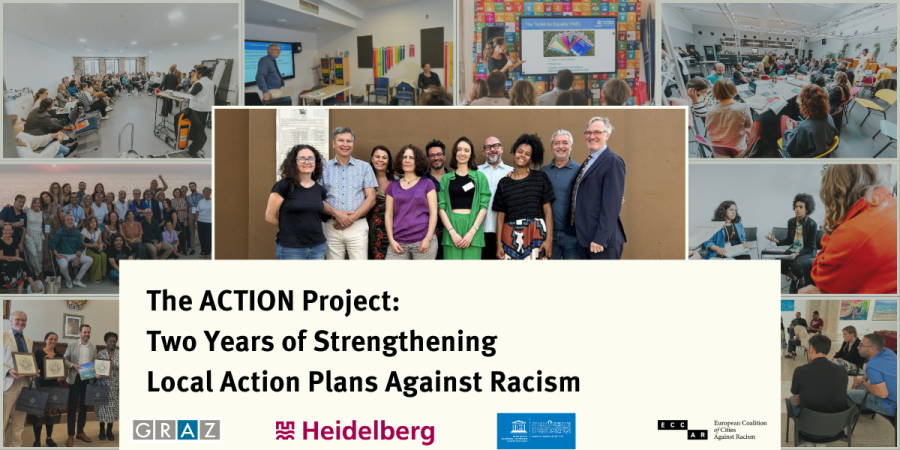
After two years of collaboration, the ACTION Project has officially concluded. Co-funded by the European Union, this initiative played a key role in supporting cities in developing local action plans against racism. By updating the Toolkit for Equality chapter (TKE) on the 10-Point Plan of Action (10-PPA), the project provided cities with structured, actionable steps and reinforced the vital role of concrete action plans in achieving long-term impact at the local level, in today’s context, where racial discrimination remains a pressing challenge.
Reflecting on Achievements
One of the major outcomes of the project was the updated TKE Chapter, which offers municipalities a practical, step-by-step framework for implementing the 10-PPA, tailored to their local contexts. This updated version includes an expanded “Resources & Examples” section, featuring updated action plan resources and best practice examples, thanks to the contributions of ECCAR Member Cities, like Barcelona (Spain), Bologna (Italy), Bonn (Germany), Bordeaux (France), Botkyrka (Sweden), Brussels (Belgium), Cologne (Germany), Ghent (Belgium), Graz (Austria), Heidelberg (Germany), Helsingborg (Sweden), Leuven (Belgium), Turin (Italy) and Vienna (Austria). A key addition was the APPLIED PRACTICES section, which introduced a Model template for drafting action plan commitments and the 4X4 method, —a structured approach emphasizing collaboration among four key actor groups (civil society, local administration, policymakers, and experts) across four action areas: information and counseling, awareness-raising, enforcement, and research and innovation. The updated TKE Chapter, now available in English, French, German, Italian and Spanish, will remain a vital resource for cities working toward impactful anti-racism efforts.
The Project employed a variety of capacity-building services, including webinars, workshops, direct consulting with city officials, and a video series shared on social media to raise awareness, increase visibility, and engage ECCAR members. A core resource during the webinars and workshops was the "Grazer Methode" (Graz Method), a Human Rights-Based Approach, that guided local authorities through five phases - Assessment, Consultation, Plan Development, Implementation, and Evaluation. This methodology helped align local action plans with human rights standards while fostering collaboration, and sharing best practices.
The most in-demand form of capacity-building was direct consultation. The ACTION Team provided direct consulting to 19 municipalities, supporting 15 cities in developing or updating their action plans. As a result, three cities officially adopted their action plans following the project. These consulting sessions leveraged the Model Template presented in the updated TKE, helping cities draft structured 10-PPA commitments with clear action points, measurable objectives, and sustainable monitoring mechanisms. Additionally, model templates for specific commitments, such as fair housing, provided concrete guidance for local implementation.
The project also developed 22 online courses addressing the Toolkit’s five key sections (Introduction on the Toolkit for Equality; Why is it necessary; Foundation; Putting into Practice; Follow-up). Featuring best practice examples from ECCAR Member Cities, the videos offer real local strategies for overcoming challenges. With diverse contributions from mayors, city administrators, civil society representatives, UNESCO officials, and human rights experts, these courses inspired cities to develop and refine their anti-racism action plans. The videos, subtitled in 13 languages, are disseminated through digital platforms like Instagram and YouTube and the integration of short, engaging video formats linked to in-depth content maximized accessibility and engagement, making the ACTION videos a model for innovative digital capacity building.
A heartfelt thank you goes to the ACTION Consortium, composed by Elke Kahr (Mayor of Graz), Prof. D. Eckart Würzner (Mayor of Heidelberg), Danijel Cubelic (ECCAR), Dr Klaus Starl (ETC Graz). Their expertise and leadership were instrumental in guiding the project to success.
We also extend our gratitude to the ACTION Steering Board members from Leuven, Brussels, Bonn, Cologne, Bologna, Bordeaux, Barcelona, Graz, Heidelberg, Vienna, and Botkyrka, whose dedication and strategic input significantly shaped the project. Their efforts will continue to inspire future initiatives.
Though the project has formally concluded, the mission to build inclusive, anti-racist cities continues. With more specific action plans now in place, cities are better equipped to implement targeted strategies that address local challenges. The ACTION Project has laid a strong foundation for ongoing efforts, and the updated resources it provided will continue to support municipalities in their fight against racism. We are proud of the tangible impact made during the ACTION Project and grateful to all who contributed.
About the ACTION Project
The ACTION Project aimed at developing local action plans to combat racism. Co-funded by the European Union for two years, it was linked to the existing Toolkit for Equality (TKE), first published by ECCAR in 2016 as part of a previous EU-funded initiative. The TKE included the establishment of a 10-Point Plan of Action (10-PPA) for addressing racism at the local level, with the goal of supporting the implementation of effective local policies to fight racism.
As part of the ACTION Project, the ECCAR 10-PPA chapter of the Toolkit was updated to address current challenges and made available to all members in their national languages. Additionally, European cities were supported through direct consulting, webinars, and online courses focused on local 10-PPA implementation. The ACTION Project aligned with the EU Anti-racism Action Plan 2020–2025 and received particular promotion from the Swedish presidency at the national level.
